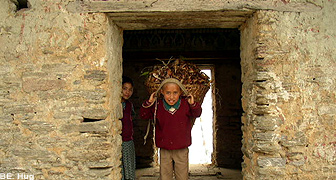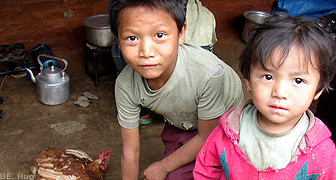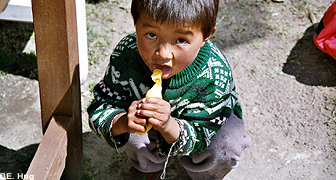
|
|
Appeals
for peace
|
November
2004
| The
US and EU urged the Maoists to come for a dialogue for the peaceful solution
of the conflict in Nepal. We urge the (Nepal) government to uphold the
offer for peace talks. At the same time, the Kathmandu-based missions strongly
appeal to the government, the political parties, the Royal Palace and the
Royal Nepal Army to commit themselves to a joint approach in this respect. |
April
2004
Minister
for Home: There is a need for a third-party mediation in resolving
the Maoist problem. |
| The Nepali
Diaspora's agenda presented to King Gyanendra: Free and fair elections,
reconciliation between the King and the political parties, transparency
and accountability by the political parties, an end to acts of violence
and intimidation by the Maoists, resumption of peace talks. |
| Rashtriya
Prajatantra Party appeals to Maoist rebels to join the the negotiating
. There is no alternative to peace talks to resolve the problems
of the country. |
| Bamdev
Chhetri, a central committee member of CPN-Maoist: "If the King creates
a conducive environment for talks, the Maoist will not only hold dialogue
with the King, but will be ready to sit for a round table talk with
all the parties involved in the ongoing conflict." |
| RNA
spokesmen Brig. Gen. Rajendra Bahadur Thapa: Army don't want truce,
but permanent peace. |
| The
International Coordination Council (ICC) of the Non Resident Nepali Association
(NRNA) Chairman Dr. Upendra Mahato urged all Nepalese to engage in
and be a part in bringing peace and reconciliation in Nepal. |
March
2004
| Minister
for Home Thapa has ruled out the possibility of immediate peace talks
with the Maoist rebels. He calls on Maoists to utilize election as a opportunity
to resolve Nepal's problems through negotiations. |
Finance
Minister Lohani urged the Maoists to come to the negotiating table.
Nepal
Congress Party leader Koirala want to initiate a dialogue with the
Maoists to rescue the country from the current crisis |
| Maoist
top leader Prachanda welcomed UN Secretary -General's appeal to end
violence and resume the peace process. |
| King
Gyanendra's appeal in Pokhara: "Violence and disruptive activities
will not be in interest of any one. That is why we hope all those who I
believe in democratic values and constitutional process would join the
highway of peace and understanding in the greater interest of the people."> |
 |
SECRETARY-GENERAL:
APPEALS FOR RESUMPTION OF PEACE PROCESS |
read
more |

|
|
Peace
- Preserving Nepal's Future
|

|

|

|
 |

|
|
Appeals
for peace
|
December
2004
Statement
of Sir Jeffrey James, UK special representative for Nepal- Summary
The British
Government support for peace, stability and development in Nepal, and
to help strengthen our consultation and coordination with Nepal's other
international partners.
We
continue to believe that there can be no acceptable military solution to
the conflict. The only sure way to a lasting peace is through negotiations
conducted with good faith and willingness to succeed.
This
underlines the urgent need to initiate and sustain an effective peace process.
We welcome the Government's willingness to enter into negotiations without
preconditions. We call upon the Maoists to respond constructively and to
seize the opportunity for peace. We recognise the complexity of the situation,
but also the need for compromise and accommodation on all sides. The status
quo is not an option. But the overall objective should be a settlement
based on multiparty democracy and constitutional monarchy which allows
free and fair elections to the national parliament and other representative
institutions. This requires all parties to renounce violence, but it would
also give all parties the right to form a government, or participate in
government, if successful in elections. We believe that with trust and
goodwill, it should be possible to forge agreement on this basis.
September
2004
The Communist
Party of Nepal (UML) decided to exert pressure on the government and
the Maoists to start the peace process. The UML has urged its cadres and
the ordinary people as well as professionals to take to streets express
solidarity to the pro-peace movement. The party has claimed the campaign
will help create grounds for peaceful settlement of the ongoing conflict.
 |
| Kathmanduites
to mark international peace day praying for peace |
|
In
a bid to mark the international peace day on September 21,
a campaign for pace will be staged in Kathmandu. Organizers have called
on all to come to the Basantpur durbar square with candles and spare a
couple of minutes for those whose lives have been destroyed due to the
ongoing conflict in the country. Morethan 10,000 people have died during
the nine-year of insurgency. Media persons, businessmen, film artists and
teachers among others are some of the people leading the peace meeting,
according to reports.
The
organizers informed about the peace campaign amid a press conference in
the capital on Sunday.
Villagers
of different parts of Dailekh district, a Maoist stronghold, have hold
a peace rally at Dailekh, district headquarters of Dailekh district,
demanding an immediate cease-fire and an ever lasting peace in Nepal.
Nepali
Congress members, human rights activists and Maoists have also participated
in this peaceful gathering. The rally organizers have got a permission
from local administration and the security agencies. |
August
2004
| Thousands
of businessmen, school teachers and professionals took part in a peace
rally in Kathmandu urging the Maoists to withdraw their embargo and asking
the Government and the Maoists to begin peace talks. Both sides of the
conflict parties should observe a ceasefire.
The Federation
of Nepalese Chambers of Commerce and Industry (FNCCI), Nepal Chamber of
Commerce, Hotel Association of Nepal, Trekking Agents Association of Nepal,
Nepal Mountaineering Association, Nepal Nursing Association and Private
and Boarding Schools Association of Nepal (PABSON), among others, took
part in the rally. |
July
2004
| Deputy
PM B. M. Adhikari invited the Maoists to come to the negotiating table with
their agendas. The government is ready for a comprehensive dialogue. |
| Human
rights activists and leaders of various political parties have stressed
on formation of a peace commission for establishment peace in the country.
The former Speaker of the House of Representatives, Damannath Dhungana
alleged the Government of not paying attention to establish peace in the
country. |
June
2004
| The United
Kingdom urged the Nepali political parties to join the new government
and form a united front against the prevailing 'unacceptable' Maoist violence
in the country. In a personal message to reappointed PM Deuba, Secretary
of State for Foreign and Commonwealth Affairs Jack Straw welcomed Deuba's
determination to re-initiate peace process with the rebels.»
Peace talks: Deputy PM B. M. Adhikari invited the Maoists to come to
the negotiating table with their agendas. |
|

|



